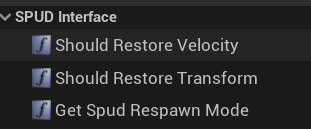Pretty sure that Cast<ISpudObject> will return null on a pure Blueprint implementation (not C++ derived). To do this it requires UKismetSystemLibrary::DoesImplementInterface instead. I was trying to avoid this because it's a much heavier call, hence the C++ only restriction originally. I haven't profiled it though so don't know the actual impact, was just being cautious.
That said if I add GameplayTag support the detection is going to get a little heavier anyway.

Change the interface prototypes in
ISpudObjectto allow overriding in both BP and C++. BP can override via the normal interface override process and interface methods will just show up in the sidebar as expected.C++ can override
*_Implementationmethods.Change existing calls to the interface functions in C++ to use the prescribed entry point that covers both C++ and BP use cases.
I ran the 4 integration tests and tested this in the SPUDExamples project to make sure everything worked out as expected. It behaves as expected.